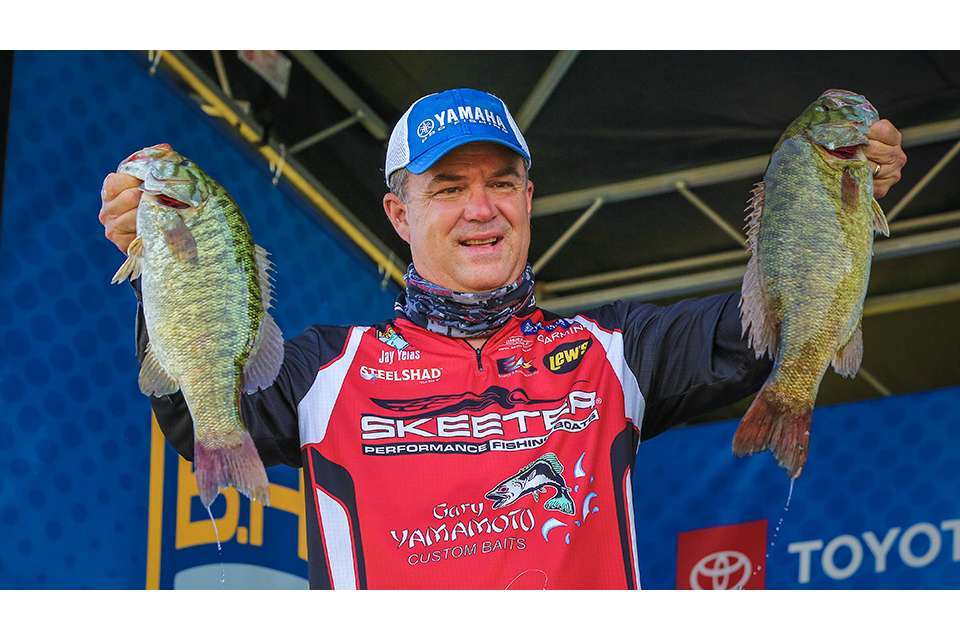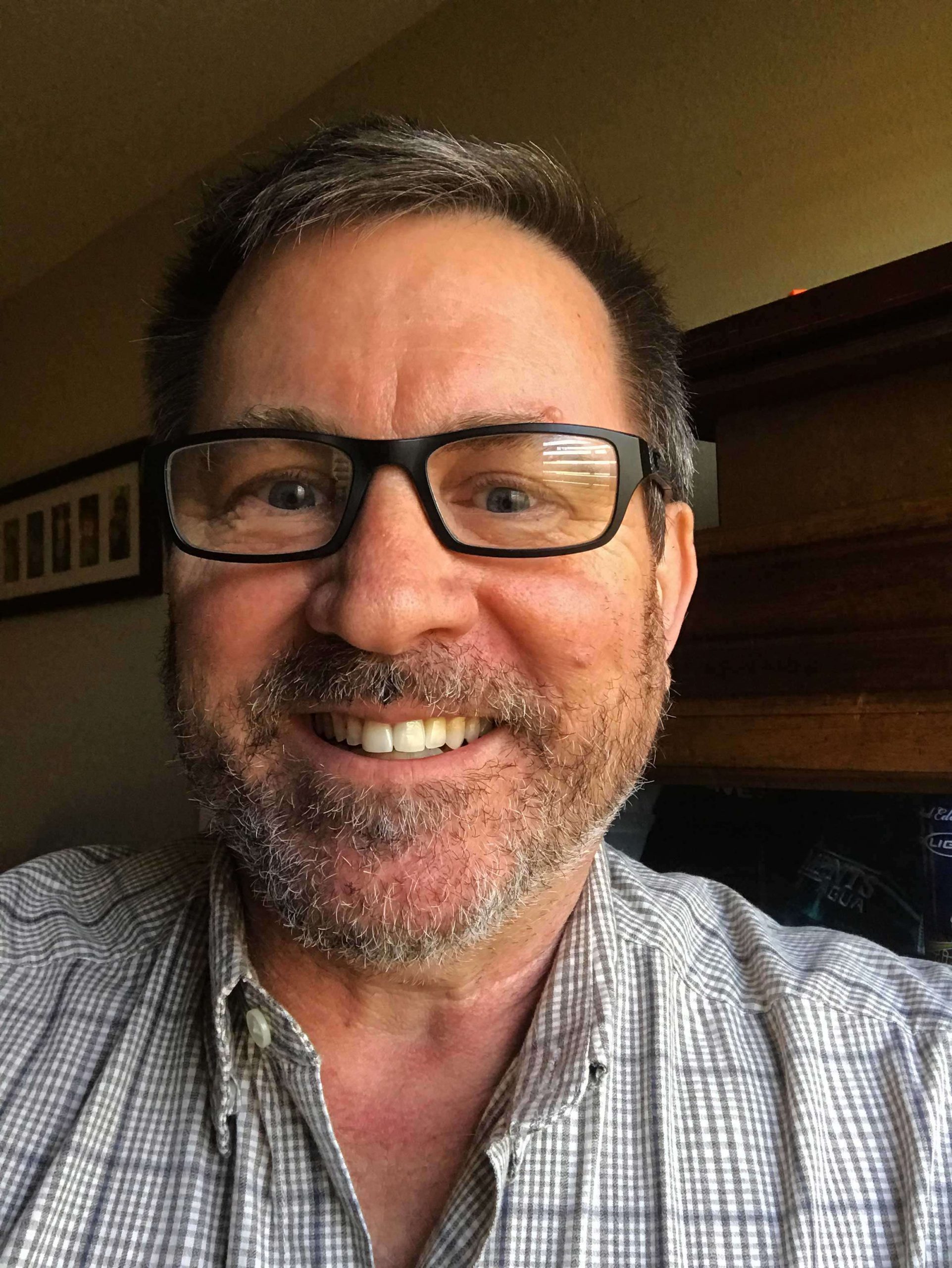
Jay Yelas can drive 55, as he’s tooling along the Bassmaster Elite Series expressway just fine, thank you.
Contacted on his 55th birthday Sept. 2, Yelas had a day fishing planned with his daughter then grilling dinner at his Lincoln City, Ore., home. The longtime pro had plenty to celebrate. He’s coming off a Top-10 finish in the Elites that moved him up the Bassmaster Angler of the Year standings, and this spring he was announced as part of the 2020 induction class to the Bass Fishing Hall of Fame.
“That’s just a huge honor, both for me and my family,” Yelas said. “What’s unique is that it recognizes a body of work over 30-plus years. There’s nothing else like it. To me it’s a major deal. I’m just thrilled to get that.
“Win a tournament or Angler of the Year title, those things are great. It’s just a great week or great year, but to have the Hall of Fame recognize a great career, and your impact on the sport was positive, made it better. Probably the biggest thing is it means you had a good influence on the overall sport of bass fishing.”
Yelas’ resume is worthy. He won the 2002 Bassmaster Classic on Lay Lake, has Angler of the Year titles in B.A.S.S. (2003) and FLW (2002, 2007), and he’s topped $2.5 million in career earnings. Yelas has qualified for 16 Bassmaster Classics and 11 Forrest Wood Cups. He also enjoyed 10 years as a board member of the C.A.S.T. for Kids Foundation, which organizes fishing trips for special needs children, and he accepted the organization’s offer to be its executive director in 2015.
“Everybody likes to know their work makes a difference, and it makes other people’s lives better, enhances everybody,” Yelas said. “I’ve been doing this so long, I like to share the joy of fishing with others.”
Yelas relished the suggestion that he’s the Mr. Rogers of bass fishing. He has a similar soft demeanor and always speaks kindly, a seemingly perfect fit to work with youth.

“When you’re a young man, tournaments seem all about you, what you can accomplish and what you can win,” he said. “Now that I’ve been in it 30 years, I still enjoy the competition, but I enjoy sharing the sport with other people and providing opportunity for people who wouldn’t normally get a chance to get out there and feel that tug on the end of their pole.”
The acronym stands for Catch A Special Thrill, and the foundation that began in 1991 has held more than 1,000 events and given that special feeling to more than 125,000 kids. Yelas related a story of a nonverbal child speaking her first words on a day on the water. (See Yelas giving kids something to talk about.)
“It puts a huge smile on their faces. It’s such a blessing to those kids,” he said. “It’s the highlight of their year. They just absolutely love it. It’s something we take for granted, but those kids don’t get a chance to fish much or at all, so it’s a special time for them. It’s fun to be able to help put events on for those kids.”
Yelas appreciates that his role in running those events was recognized in his BFHOF bio. The class, announced in April, includes B.A.S.S. angler relations manager Steve Bowman, media mogul Ron Lindner and, posthumously, lure inventor James Heddon and 1994 Classic champ Bryan Kerchal. The induction ceremony was postponed until next year because of COVID-19. While that’s a bummer, Yelas said he appreciates the Hall and what it means to the sport.
“I was on the board with the Hall of Fame for a long time, back in its infancy,” he said. “I helped it get to where it’s at today, and that makes me feel good. It’s a very worthwhile endeavor for everybody and great for the sport.”
The Bass Fishing Hall of Fame, which began inducting members in 2001, found a physical home in Johnny Morris’ Wonders of Wildlife National Museum and Aquarium in 2017. Yelas said it’s a spectacular venue, with artifacts telling the story of bass fishing from the earliest days to plaques of the latest inductees.
“I’m so thankful that Bass Pro Shops is hosting it,” he said. “It’s first class. It’s really a great home for the Hall of Fame. It’s a great bit of history for people passing through Springfield (Mo.) to stop and see the Wonders of Wildlife Museum. It’s definitely entertaining and educational and a great reflection on the history of the sport.”

Yelas has played a big part. In 216 Bassmaster tournaments, he won five times, which ties for second among active B.A.S.S. anglers. He’s posted 55 Top-10 finishes, with at least one in each of the past five decades, a statement to his staying power. Yelas finished ninth in the most recent Elite event on Lake St. Clair, moving up to 46th in the AOY standings and closer to qualifying for his 17th Classic.
“I’m right there,” he said. “I need a couple more good ones. That’d be huge. I’d love to fish the Classic again. I need to get back in that. That’d be a blast.”
It’s been 14 years since his last Classic at Lake Toho in 2006. He had fished 16 consecutive Classics before moving to FLW. Yelas said he’s gaining some inspiration from AOY leader Clark Wendlandt, who has a similar resume and is about the same age.
“Clark is killing them this year,” Yelas said. “I think it’s cool that he’s doing so well. It is inspirational for him to compete at the top of the pack at our age. If he can do it, I can get in the Classic. It’s good for the sport to have a sprinkling of veterans in there. Part of the fan base is the same age as us or older, and they like having guys their age to pull for. Hopefully, I’ll get on a bit of a roll here and get in the Classic.”
The circuit switches from the electronics-heavy Northern smallmouth fisheries to lakes with big largemouth potential. The Elites resume the revised season at Lake Guntersville on Sept. 30, then fish Santee Cooper the next week before Lake Chickamauga. Anglers have the potential to fish 12 out of 20 days. The season ends with Texas Fest on Lake Fork. Many in the 85-man Elite field are familiar with those fisheries, but not many have competed in the fall.
“I’m just thankful we’re getting them all in,” Yelas said. “The fall used to be my best time of year in the ‘90s and early 2000s. Fishing is a little tougher in the fall, and I tend to do better in the tougher tournaments. You get on a little something, and it pays off. If I have a good strong finish, I’ll be fishing the Classic in Fort Worth next March.”

